BIZ TIP TUESDAY:
YOUR FIRST CONTRACT
The good news: A producer loves your script
and wants to buy it!
The bad news: He doesn't want to pay you much (or anything) up
front, but assures you that this can be your big break into the
business! Your name up there on the big screen!
You need a lawyer. Anyone who represents himself has a fool
for a client. There is no such thing as a standard contract -
everything is negotiable. The contract a producer offers you is
stacked in the producer's favor... it was drawn up by HIS lawyer.
You need your own lawyer to balance it out. But lawyers can be
expensive - how can you tell if this deal is worth the
expense?
Here is some quick, lay-advice on contracts. I am not a
lawyer, but I've sold enough scripts to know what a bad deal
looks like, so here are some things to watch out for...
SIGNATORY OR NOT?

The big game changer on your first contract will be the answer to the question: WGA Signatory Company... or not? Many writers believe that no matter what the budget of the film they will get WGA minimums, but you will only be paid WGA minimums if the company is WGA signatory - and *many* companies are not... including most of the low budget and indie companies you may come into contact with at the beginning of your career. If the company that wants to buy your screenplay *is* WGA Signatory, then your deal will follow the MBA (basic WGA contract) and you should try for any "bumps" (explained later in the tip) or bonuses that your lawyer can squeeze into the contract. Even a basic WGA contract is negotiable (upwards) - which is why Akiva gets paid much more than I do. Always try to get the best deal that you can - which is one of the reasons why you need a lawyer (or an agent) negotiating your deal. Actor Peter Coyote says if they haven't said "No" you haven't asked for enough money.
But most of this tip is aimed at the non-signatory companies you might sell your first script to - and their minimum payment for a screenplay is $1. They can pay whatever they want, and will try to pay as little as possible... because the screenplay is one of the very first expenses - and may be out of their pocket before they have the film funded. If that is the case, you'll want an option deal on your script for enough money that it means something to the producer - there is a tip in rotation about options with some details on that process. But you will still want a reasonable deal for the sale of the screenplay, which is the subject of *this* tip.
Because there are no minimums for non-sig companies, you need to get *everything* spelled out in your contract. I do not know the ratio of non-sig companies to signatories - but there are a lot of them out there, and just because a company seems big and established does not automatically make it signatory. A WGA member can not sell to a non-sig company (unless they create a signatory LLC on the side), but a non-WGA writer *can* sell to a non-sig, which may give you an advantage. Non-sigs are non-sigs for a reason, and are not going to go signatory just because they love your screenplay. Though I think it's just wrong that a company that will hire SAG actors and maybe even a DGA director will not want to pay WGA rates, that happens often in the indie and low budget world. But just because a company is not signatory is no reason for the writer to get ripped off. Even if it is your very first script sale, they can't make a movie without a screenplay - you are an important part of the equation.
DEFERRED SALARIES

Are worthless. If a producer offers you no (or little) money
up front against a percentage of the finished film's sales, run
away! There are garages full of completed films that have no
distributor and will never earn a cent. My friend runs a large
film crewing agency - he crews about 3,000-4,000 films a year.
Less than 500 of those get ANY form of release. The rest don't
get theatrical or video or cable or shown in drive-ins or on
airplanes or in prisons or even video release in foreign
countries. Nobody ever sees them and they never make a cent. They
LOSE money! If the film is made and NEVER RELEASED not only do
you make nothing off a deferred salary deal, your script is dead
forever (unless you have a clause returning it to you). You have
just sold your script for a percentage of profits that don't
exist! You sold your script for nothing. My friend with the
crewing agency tells his people not to work for deferred
salaries, and that's my advice, too.
On any film where you are not paid up front, you are a
PRODUCER - you are investing your screenplay into the project. If
they have the cajones to offer you a deferred salary, are they
also offering you a producer credit and gross participation in
the profits?
They are going to spend actual money to rent equipment, buy
raw stock, pay lab fees, hire actors. The crew will be getting
paid (my friend at the crewing agency will see to that) so why
should the writer be the only guy not paid? If they can afford to
pay for equipment, they can afford to pay for the script. If they
CAN'T afford to pay for the script, the film is probably so low
budget that it has no chance of being released (so that deferred
pay means nothing). Movie distributors want stars (some level),
and professional production values. The film is sitting on the
shelf at Blockbuster next to some big Hollywood blockbuster - the
consumer needs some reason to rent THIS film over the one that
stars Bruce Willis and his asteroid. (#2 has to try harder). If
this film is offering NOTHING, it will not be picked up... and
end up in someone's garage forever.
These days, everyone with access to a video camera wants to make a "no budget"
movie, and all they need is a script. So they want your script on a deferred deal...
Hey, even the crew is getting deferred salaries on these films. Problem is, movies
made for nothing are even bigger gambles. I know a guy who has made seven "no budget"
films, and not a single one has any form of distribution! No DVD, no nothing! My
advice on a "no budget" film is - if this guy can find no money and an all volunteer
crew to make a movie, so can you. Do the film yourself, and if it makes any money or gets distribution,
it's *your* movie. Yes, some of you will not want to go to the trouble of making the movie
yourself, but give it some consideration - you jump from unproducer writer to *writer-producer*
and probably make a bunch of connections along the way.
Exception to no pay: If you're doing it for love. If this project's
value to you is NOT as a commercial venture. Know that when you
enter into any deal, the money in your contract is all you will
ever get. Those "monkey points" are worthless. The back end deal
just means the writer takes it in the back end. Any money
contingent on something else happening is no money at all. If you
want to DONATE your script to a film - that's your call. You can
screen the film in your garage, and be happy.
WHAT YOU SHOULD MAKE

On a low budget (including non-WGA) movie a screenwriter should make about 2%-3% of
the film's budget (you may make more or less, but that's the ballpark). When most
indie films increase budget, most of that increase is going to a star, not the whole film -
and producers aren't about to cut into the star's money to raise your pay. But try to stay in
that 2%-3% range *excluding* the star's salary. If the producer has no idea
what the budget will be, work out a deal for a reasonable base rate or 2.5% of the budget,
whichever is greater.
Greg Goodell's Independent film budgeting book says to budget
5% for script purchase and development overhead (I think it's on
page 72). That percentage is echoed in every budgeting book I've
ever seen. If your producer thinks 3% is too much to pay, have
him look it up (he'll probably be using that budgeting book
anyway, since it focuses on low budget films). Paying a writer 3%
of the budget is completely reasonable.
You should have your lawyer try for additional "bumps" based on the
film's performance in ancillary markets. These "bumps" will be
bonuses if the film sells a large number of DVDs or has a
successful foreign theatrical release or shows on additional
cable networks. Instead of a % of *each* DVD, which will be difficult
because the producer wants to sell their movie to a distrib without all
kinds of book keeping costs passed on to the distrib... but a bonus if the
film ships an amazing number of units on DVD is easy. Find out how many
units a successful similar film sold (Video Business mag online or one of
the others might have this info) and then build in a bonus payment when sells,
I don't know, 50k more copies than the example film. Basically what you are
doing is not getting any extra money if the film sells a normal number of DVDs,
but sharing if the film is a big hit on DVD. My contracts have "bumps" for HBO, Showtime,
USA Network sales and for over a certain number of videos & DVDs
sold. These "bumps" cost the producer nothing - but if the film
is successful, I participate in all of that cash pouring in... as
I should. I made up the story.
You should also get "net points" - also known as "monkey
points" - a percentage of any net profit. You should get
somewhere between 2% and 5% depending on how important your
script is to the over-all deal. "Monkey points" are usually
worthless - creative book keeping makes sure that even the
biggest hit film never makes any actual profit. Remember that
the first HARRY POTTER movie grossed hundreds of millions of dollars... but
seems to be still in the red according to a recent article on studio accounting - No
"monkey points"!
One issue with non-sig companies and points is that means they have to really
do book keeping and have open books - and they hate that. It's paperwork. I'd try for it,
but no movie ever makes a profit, so don't make this your big fight.
A TON OF MONEY!

Once that contract is signed you get a massive check, right?
Wrong.
The average low budget (non-sig) contract is similar to the average WGA Signatory contract in that you will not get all of your money at once... and you may not even get all of the money in your contract. The screenwriting payment is broken up into pieces. Usually there is a fee paid on the signing of the contract - and make sure this fee is a reasonable amount. If this is in the form of an option, make sure that the option is enough to make your script a priority to the producer... and enough to cover at least some of the time it took you to write that script. The actual script fee is often paid on first day of principle photography, but you want to get some money just from signing the contract, in case the film never gets made. Plan on the film not getting made when you make your deal - because only one in ten purchased scripts makes it to principle photography.
You will also get a fee for each rewrite - there will usually be two rewrites and a polish in the contract. You want to make sure that these portions of the fee pay for the time it will take you to do a major rewrite on the screenplay. You also want to make sure that these rewrite fees are *not* subtracted from your total payment if they choose not to have you do the rewrites. If 25% of your total fee is for rewrites, you don't want to end up with only 75% of your agreed upon fee because they didn't have you do the rewrites... or had their girlfriend do them for free. Always try to create an incentive to keep you on as the writer!
You will probably get the larger part of your total script fee as a "production bonus" when the film actually goes into production - you want to make sure that you get the production bonus even if other writers are involved. On a signatory film the writers split the production bonus - but it is also a great deal more money than we are talking about on a low budget film. If the producer does want to split the production bonus, you need to make sure that without it you are paid a reasonable rate - at *very least* two times what it cost you in time to write the script (unless you are a really slow and lazy writer) - and no less than what you would be paid weekly during the pre-production, production, and post production of the film - you don't want some PA (go-fer) getting paid more than you on the film! The secret key to screenwriting is "one for you and one for me" - make at least enough money to pay for the time it took you to write the script you sell, plus write another script to sell. You want to be getting ahead, not just "breaking even".

Most contracts will have
a "buy-back" clause in the event the film never goes into
production. Make sure your lawyer puts a buy-back clause in your
contract! You don't want to have any scripts in limbo - you don't
own them, but the producer has no plans to make them. Because many scripts never make it to screen, without some sort of buy-back, you may end up with dead scripts all over town. I have a couple of scripts I sold when I first started out that had no buy-back clause, and I do not own the rights to them. A few years ago I had a meeting with one of the producers to get the script back, and the SOB told me I could buy it back for what I get paid *now* plus 25%... not what I was paid for it a couple of decades ago. He would make almost 100 times what he paid me if I did that... and I can not sell the script to anyone else unless I buy it back. Once you get into the WGA this isn't a huge problem with WGA signatory scripts, because the MBA has a built in buy-back clause:
after the project has been dead for 5 years you can buy it back for what they paid you. That may still be an issue if you made a lot of money from that script sale - you may need to weight the benefits of having that script to sell again. Because some scripts actually take 10 years to get to the screen, companies tend not to be interested in some sort of reduced rate buy-back clause in the contract... but have your lawyer give it a try anyway.
On a non-WGA project I would try to get the credit locked in - and "single card"
(means you get the whole screen for a moment). On a WGA contract, credits are decided by the WGA (so whatever it says in the contract doesn't matter).
CAN I TRUST THESE GUYS?

Last: There are two types of low budget, and two types of
criminal activities. Organized and small time wackos. Organized
crime are guys like Eric Roberts in THE DARK KNIGHT, they make money, they wear suits, they are businessmen. They
have offices. You can depend on them. They've been doing this for
years. They play by the odds and don't take any chances. Small
time wackos are guys like Heath Ledger's joker - they rob a liquor store because they need a heroin fix...
or maybe just for fun. As Michael Caine says - "Some men just want to watch the world burn."
They are undependable, have no idea if they will live out the
day.
Everything is a long shot. You don't want to work with the
wackos. There are plenty of organized low budget guys out there
with offices, distribution deals in place, and plenty of past
credits. The thing that separates a REAL producer from someone
who just claims to be a producer is...
What have they
produced?
That should be the very first question you ask after they tell
you how much they loved your script - "Great! I'd like to get a
feel for the kind of films your company produces, can you
recommend one of your films for me to rent?"
Then really go out and rent the movie. It will give you a very
good idea of what you're getting in to!
I'd find a lawyer who knows this stuff, because I'm just some dude who writes scripts.
If I were a lawyer, my parents would be *happy* about my career choice.
COMING SOON!!!
Want To Look Like An Expert?
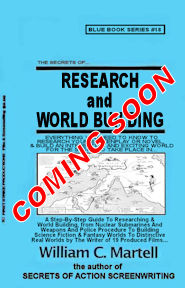
RESEARCH & WORLD BUILDING Blue Book!
Does this gun fire 6 shots or only 5? In all of the excitement of writing your action scene, you might not have done the research... and your hero could be out of ammo! Whether you are writing a novel or screenplay, you can save your hero, and your story, by doing a little research first! This book looks at Why you should research, Whether you should research First or Later, PLUS the importance of World Building in Science Fiction, Fantasy... and the worlds you explore in every other genre. Movies like JOHN WICK and THE GODFATHER take place in their own unique worlds... and writers must create them! YOU are the technical advisor on your Screenplay or Novel.
Using movie examples like TOP GUN, HUNT FOR RED OCTOBER, BLUE CRUSH, ADVENTURE LAND, several of my produced films, JOHN WICK, the novels of Donald E. Westlake and Thomas B. Dewey, SPY KIDS, the LORD OF THE RINGS movies, SOYLENT GREEN (which takes place in the far off future of 2022), and many others we will look at researching stories and creating worlds. The 8 Types Of Research, the 10 Types Of Information To Look For, 12 Important Elements Of World Building. Plus chapters on How To Rob A Bank and Commit Murder And Get Away With It for those of you interested in crime fiction, and Researching The Future for those writing science fiction, and Levels Of Reality if you are writing about a version of the real world.
No matter what you are writing, this book will help you find the facts... or make them up in a convincing way!
COMING MID JUNE!
NEW!!!
Can You Make It bigger?

BLOCKBUSTERS (and BEACH READS) Blue Book!
Writing something EPIC?
ONLY: $4.99!
Thinking about writing a big Disaster Movie? An Historical Epic? An Epic Adventure Film? Or maybe you like Gladiator Movies? This book looks at writing Blockbusters and those Big Fat Beach Read novels - anything epic! Usng movies like JAWS, POSEIDON ADVENTURE, LAWRENCE OF ARABIA, THE GUNS OF NAVARONE, and those MARVEL and FAST & FURIOUS flicks as examples. What *is* a Blockbuster? 107 years of Blockbuster history! Blockbuster Characters. Blockbuster Story Types! Why modern Blockbusters are soap operas! Social Issues in Blcokbusters? Big Emotions! Keeping All Of Those Characters Distinctive! How to avoid the Big problems found in Big Movies and books! More! If you are writing a Big Event Movie or a Big Fat Novel, there are tips and techniques to help you!
Only $4.99
NEW in 2020!
Making Your Own Movie?
WRITE IT: FILM IT BOOK!

Making Your Own Movie?
Writing An Indie Film?
Writing A Low Budget Genre Script To Sell?
Writing A Made For TV Holiday Movie?
You will be writing for BUDGET. On a standard spec screenplay, you don’t have to think about budget, but these types of screenplays writing with budget in mind is critical!
If you are making your own movie, budget, is even more important - and you need to think about budget *before* you write your screenplay... or you will end up with a script that you can’t afford to make (or is a struggle to make). Everyone is making their own films these days, and even if you have done it before there are lots of great techniques in this book to get more money on screen - for less money! You can make a film that looks like it cost millions for pocket change.
344 Pages - ONLY: $7.99!
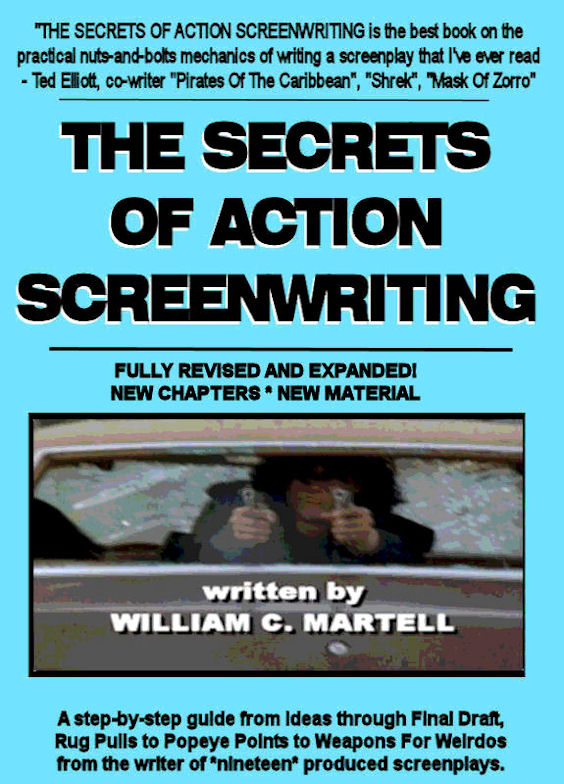
THE BOOK THAT STARTED IT ALL!
*** THE SECRETS OF ACTION SCREENWRITING *** - For Kindle!
*** THE SECRETS OF ACTION SCREENWRITING *** - For Nook!
Why pay $510 for a used version of the 240 page 2000 version that used to retail for $21.95? (check it out!) when
you can get the NEW EXPANDED VERSION - over 500 pages - for just $9.99? New chapters, New examples, New techniques!
"SECRETS OF ACTION SCREENWRITING is the
best book on the practical nuts-and-bolts mechanics of writing a screenplay I've ever read."
- Ted Elliott, co-writer of MASK OF ZORRO, SHREK, PIRATES OF THE CARIBBEAN and the sequels (with Terry Rossio). (ie; 4 of the top 20 Box Office Hits Of ALL TIME.)
Only $9.99 - and no postage!
NO KINDLE REQUIRED! Get the *free* app (any device, except your Mr. Coffee) on the order page on Amazon!
BRAND NEW!
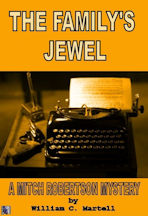
***
MITCH ROBERTSON #2: THE FAMILY'S JEWEL *** - For Kindle!
"The Presidential Suite of the Hollywood Hoover Hotel looked like a bloody battlefield: bodies everywhere, furniture broken, red liquid dripping from the walls, dead soldiers littering the elegant Berber rug as clouds of smoke overhead bounced between two air conditioning vents.
Mitch Robertson stepped over the body of an ex-child star turned sex tape star turned pop star and entered the room, spotted a gun on the floor and picked it up... careful not to spill his coffee with three pumps of mocha syrup from Penny’s Coffee Shop. That coffee was gold, the only thing keeping him going in this dazed state of wakefulness. The gun felt light. Holding it, he saw the silhouette of an 80s action star sitting sideways on a tipped over chair. Motionless. Was he dead? Mitch was still hung over from the Awards Party the night before, and wondered whether this was all some sort of crazy nightmare that he would wake up from... but when he tripped over the brown legs of a bottomless Superhero, flaccid junk encased in a condom but still wearing his mask, and hit the edge of the sofa, gun skittering and coffee spilling, he realized that it was all very real. What the hell had happened here?"
Short Novel. Only 99 cents! - and no postage!
ADVICE FROM 1920!
*** VINTAGE #1: HOW TO WRITE PHOTOPLAYS *** - For Kindle!
***
Screenwriting books have been around as long as films have. This series reprints vintage screenwriting books with a new introduction and history, plus new articles which look at how these lessons from almost 100 years ago apply to today’s screenplays. Anita Loos book is filled with information which still applies.
In addition to the full text of the original book, you get the full screenplay to Miss Loos' hit THE LOVE EXPERT, plus several new articles on the time period and women in Hollywood.
ONLY $2.99 - and no postage!
Tips FAQ

My New Script Secrets Newsletter!


STORY IN ACTION SERIES!

THE MISSION IMPOSSIBLE MOVIES
NEW: Updates On Films 7 & 8 Casting!
All Six Movies analyzed! All of the mission tapes, all of the “that’s impossible!” set pieces and stunts, the cons and capers - and how these scenes work, the twists and double crosses, the tension and suspense (and how to generate it), the concept of each film as a stand alone with a different director calling the shots (broken in the sixth film), the gadgets, the masks, the stories, the co-stars and team members (one team member has been in every film), the stunts Tom Cruise actually did (and the ones he didn’t), and so much more! Over 120,000 words of fun info!
THE MISSION IMPOSSIBLE MOVIES - 347 Pages - Only $3.99 !

BRAND NEW!
*** THE BOURNE MOVIES
NEW: Updates on TREADSTONE TV show!
All five "Bourne" movies (including "Legacy" and it's potential sequels) - what are the techniques used to keep the characters and scenes exciting and involving? Reinventing the thriller genre...
or following the "formula"? Five films - each with an interesting experiment! A detailed analysis of each
of the films, the way these thrillers work... as well as a complete list of box office and critical
statistics for each film. This book is great for writers, directors, and just fans of the series.
Only $3.99 - and no postage!
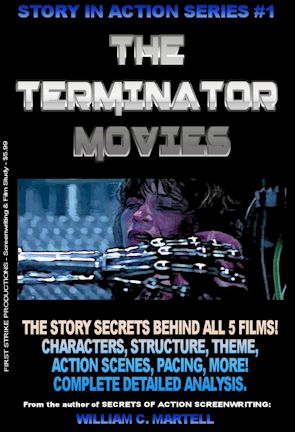
Over 240 pages!
*** THE TERMINATOR MOVIES *** - For Kindle!
He's back! The release of "Terminator: Dark Fate" is set to begin a new trilogy in
the Terminator story... 35 years after the first film was released. What draws us to these films about
a cybernetic organism from the future sent back in time? Why is there a new proposed trilogy every few
years? This book looks at all five Terminator movies from a story standpoint - what makes them work
(or not)? What are the techniques used to keep the characters and scenes exciting and involving? How
about those secret story details you may not have noticed? Containing a detailed analysis of each of
the five films so far, this book delves into the way these stories work... as well as a complete list of
box office and critical statistics for each film. This book is great for writers, directors, and just
fans of the series.
ONLY $3.99 - and no postage!
NO KINDLE REQUIRED! Get the *free* app (any device, except your Mr. Coffee) on the order page on Amazon!
HITCHCOCK FOR WRITERS!
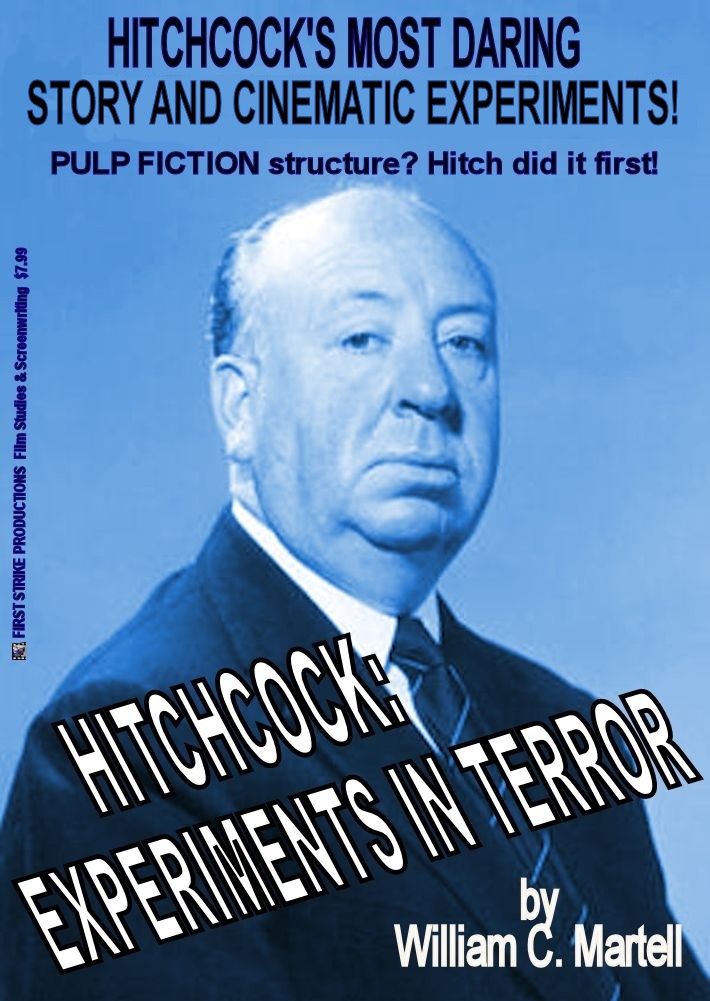
Strange Structures!
*** HITCHCOCK: EXPERIMENTS IN TERROR! *** - For Kindle!
***
Contained Thrillers like "Buried"? Serial Protagonists like "Place Beyond The Pines"? Multiple Connecting Stories like "Pulp Fiction"? Same Story Multiple Times like "Run, Lola, Run"?
HITCHCOCK DID IT FIRST!
This book focuses on 18 of Hitchcock's 52 films with wild cinema and story experiments which paved the way for modern films. Almost one hundred different experiments that you may think are recent cinema or story inventions... but some date back to Hitchcock's *silent* films! We'll examine these experiments and how they work. Great for film makers, screenwriters, film fans, producers and directors.
Only $5.99 - and no postage!
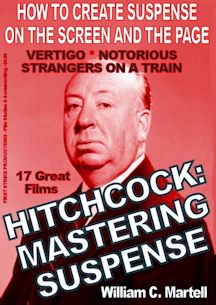
LEARN SUSPENSE FROM THE MASTER!
*** HITCHCOCK: MASTERING SUSPENSE *** - For Kindle!
Alfred Hitchcock, who directed 52 movies, was known as the *Master Of Suspense*; but what exactly is suspense and how can *we* master it? How does suspense work? How can *we* create “Hitchcockian” suspense scenes in our screenplays, novels, stories and films?
This book uses seventeen of Hitchcock’s films to show the difference between suspense and surprise, how to use “focus objects” to create suspense, the 20 iconic suspense scenes and situations, how plot twists work, using secrets for suspense, how to use Dread (the cousin of suspense) in horror stories, and dozens of other amazing storytelling lessons. From classics like “Strangers On A Train” and “The Birds” and “Vertigo” and “To Catch A Thief” to older films from the British period like “The 39 Steps” and “The Man Who Knew Too Much” to his hits from the silent era like “The Lodger” (about Jack The Ripper), we’ll look at all of the techniques to create suspense!
Only $5.99
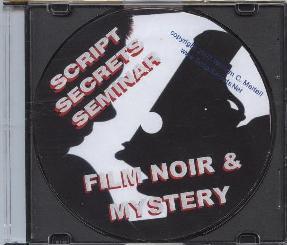
AUDIO CLASS!
NOIR & MYSTERY80 minute CD packed with information on writing Film Noir and Mystery scripts. Using examples from CHINATOWN to OUT OF THE PAST to DOUBLE INDEMNITY you'll learn how to create stories in this dark, twisted genre. How to plant clues, red herrings, suspects, victims, spider women, fallen heroes, the funhouse mirror world of noir supporting characters... and the origins of Film Noir in literature Noir dialogue and how noir endings are different than any other genre. All of the critical elements necessary to write in this critically popular genre.
The Noir & Mystery Class is only $15 (plus $5 S&H). First 20 on Limited Black Disk!
RECESSION SALE! $5 OFF!
IDEAS AND CREATIVITY - 80 minute CD packed with information. Tools to find ideas that are both personal *and* commercial. Hollywood wants scripts with High Concept stories... but not stupid scripts. Developing *intelligent* high concept ideas. How to turn your personal story into a blockbuster - or find your personal story in a high concept idea. Brainstorming and being creative. Ideas and Creativity is $10.00 (plus $5 S&H)
WRITING INDIES - Writing an Indie film? This class covers everything you need to know - from Central Locations to Confined Cameos. Using examples from SWINGERS, THE COOLER, STATION AGENT and others, this 80 minute CD is packed with information. How Indoe films challenge the audience (while mainstream films reassure the audience). Structures, using BOYS DON'T CRY, RUN LOLA RUN, HILARY & JACKIE, and others as example. Writing for a budget, writing for non-actors, getting the most production value out of your budget. Writing Indies is $10.00 (plus $5 S&H)
WRITING HORROR - The essentials of a horror screenplay - what do ROSEMARY'S BABY, NIGHT OF THE LIVING DEAD, THE EXORCIST, BRIDE OF FRANKENSTEIN, THE OTHERS and OPEN WATER have in common? This class will tell you! All of the critical elements necessary to write a script that scares the pants off the audience. Writing Horror is $10.00 (plus $5 S&H).
Click here for more information on CLASS CDs!
THE BLUE BOOKS!
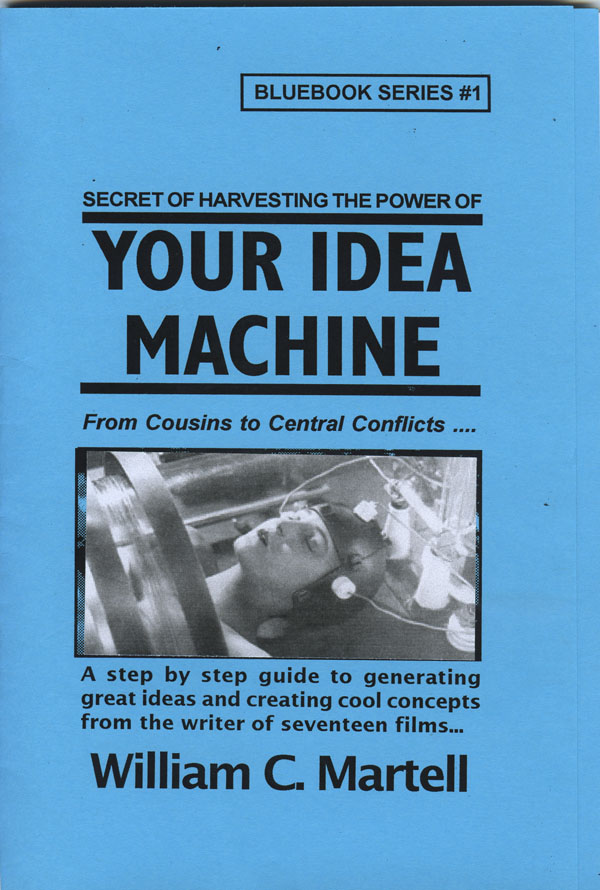
FIND A GREAT IDEA!
*** YOUR IDEA MACHINE *** - For Kindle!
****
Expanded version with more ways to find great ideas! Your screenplay is going to begin with an idea. There are good ideas and bad ideas and commercial ideas and personal ideas. But where do you find ideas in the first place? This handbook explores different methods for finding or generating ideas, and combining those ideas into concepts that sell. The Idea Bank, Fifteen Places To Find Ideas, Good Ideas And Bad Ideas, Ideas From Locations And Elements, Keeping Track Of Your Ideas, Idea Theft - What Can You Do? Weird Ways To Connect Ideas, Combing Ideas To Create Concepts, High Concepts - What Are They? Creating The Killer Concept, Substitution - Lion Tamers & Hitmen, Creating Blockbuster Concepts, Magnification And The Matrix, Conflict Within Concept, Concepts With Visual Conflict, Avoiding Episodic Concepts, much more! Print version is 48 pages, Kindle version is over 175 pages!
Only $4.99 - and no postage!
FIGURE OUT YOUR STORY!
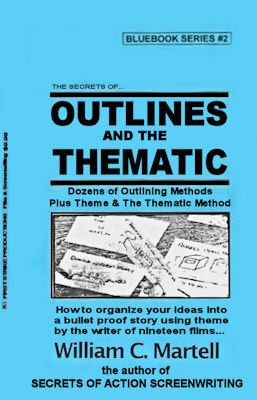
OUTLINES & THE THEMATIC Blue Book.
ARE YOUR SCENES IN THE RIGHT ORDER?
AND ARE THEY THE RIGHT SCENES?
Your story is like a road trip... but where are you going? What's the best route to get there? What are the best sights to see along the way? Just as you plan a vacation instead of just jump in the car and start driving, it's a good idea to plan your story. An artist does sketches before breaking out the oils, so why shouldn't a writer do the same? This Blue Book looks at various outlining methods used by professional screenwriters like Wesley Strick, Paul Schrader, John August, and others... as well as a guest chapter on novel outlines. Plus a whole section on the Thematic Method of generating scenes and characters and other elements that will be part of your outline. The three stages of writing are: Pre-writing, Writing, and Rewriting... this book looks at that first stage and how to use it to improve your screenplays and novels.
Only $4.99 - and no postage!
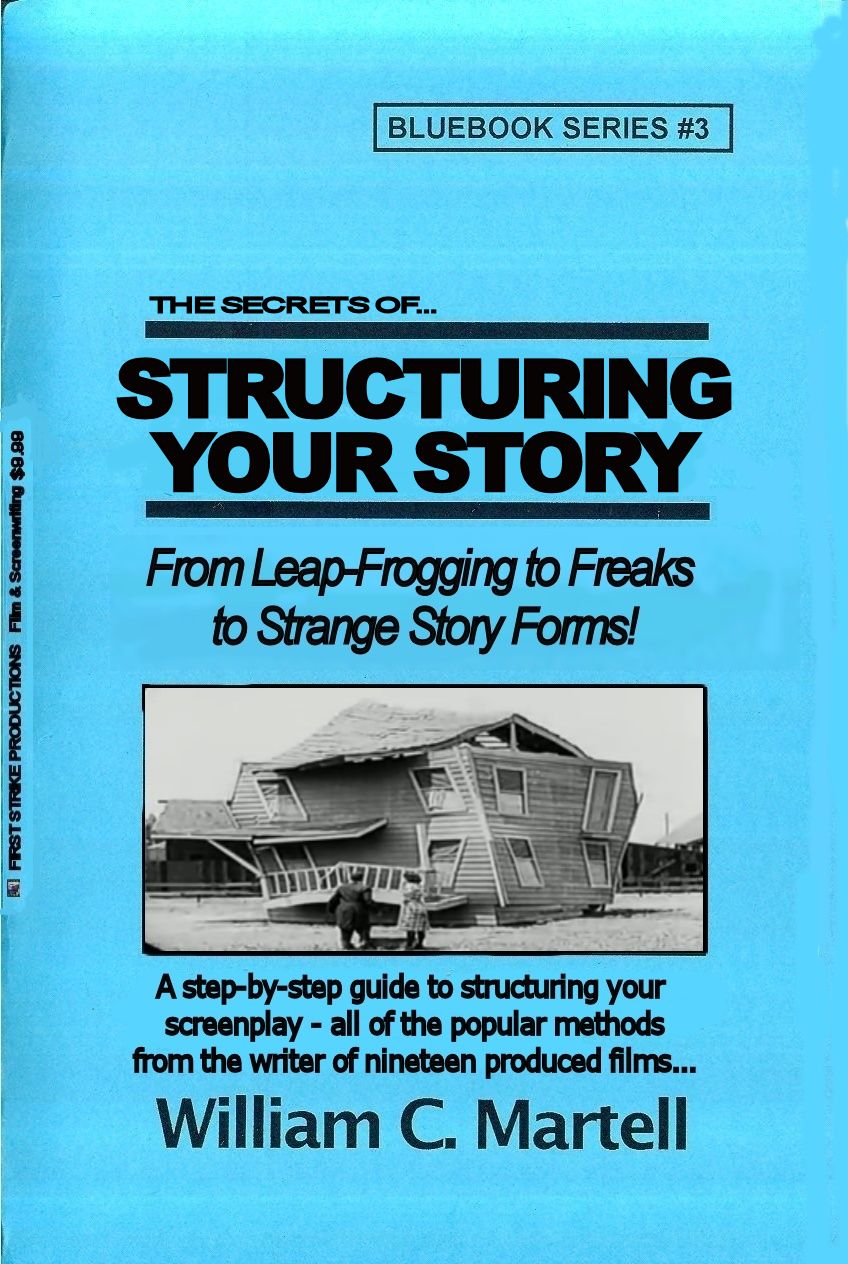
GOT STRUCTURE?!
*** STRUCTURING YOUR STORY *** - For Kindle!
William Goldman says the most important single element of any screenplay is structure. It’s the skeleton under the flesh and blood of your story. Without it, you have a spineless, formless, mess... a slug! How do you make sure your structure is strong enough to support your story? How do you prevent your story from becoming a slug? This Blue Book explores different types of popular structures from the basic three act structure to more obscure methods like leap-frogging. We also look at structure as a verb as well as a noun, and techniques for structuring your story for maximum emotional impact. Most of the other books just look at *structure* and ignore the art of *structuring* your story. Techniques to make your story a page turner... instead of a slug!
Only $4.99 - and no postage!

STORY: WELL TOLD!
*** STORY: WELL TOLD *** - For Kindle!
This book takes you step-by-step through the construction of a story... and how to tell a story well, why Story always starts with character... but ISN'T character, Breaking Your Story, Irony, Planting Information, Evolving Story, Leaving No Dramatic Stone Unturned, The Three Greek Unities, The Importance Of Stakes, The Thematic Method, and how to create personal stories with blockbuster potential. Ready to tell a story?
Print version was 48 pages, Kindle version is over 85,000 words - 251 pages!
Only $4.99 - and no postage!

START STRONG!
*** HOOK 'EM IN TEN *** - For Kindle!
Your story doesn't get a second chance to make a great first impression, and this book shows you a
bunch of techniques on how to do that. From the 12 Basic Ways To Begin Your Story, to the 3 Stars Of
Your First Scene (at least one must be present) to World Building, Title Crawls, Backstory, Starting
Late, Teasers and Pre Title Sequences, Establishing Theme & Motifs (using GODFATHER PART 2), Five Critical
Elements, Setting Up The Rest Of The Story (with GODFATHER), and much more! With hundreds of examples
ranging from Oscar winners to classic films like CASABLANCA to some of my produced films (because
I know exactly why I wrote the scripts that way). Biggest Blue Book yet!
Print version was 48 pages, Kindle version is over 100,000 words - 312 pages!
Only $4.99 - and no postage!
NO KINDLE REQUIRED! Get the *free* app (any device, except your Mr. Coffee) on the order page on Amazon!
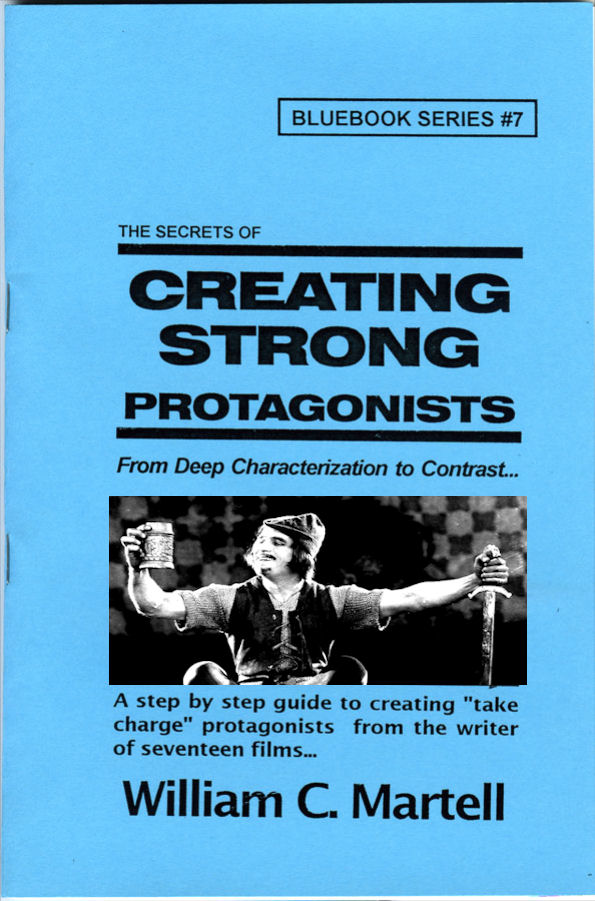
MOVIES ARE CHARACTERS!
*** CREATING STRONG PROTAGONISTS *** - For Kindle!
*** CREATING STRONG PROTAGONISTS *** - For Nook!
Expanded version with more ways to create interesting protagonists! A step-by-step guide to creating "take charge" protagonists. Screenplays are about characters in conflict... characters in emotional turmoil... Strong three dimensional protagonists who can find solutions to their problems in 110 pages. But how do you create characters like this? How do you turn words into flesh and blood? Character issues, Knowing Who Is The Boss, Tapping into YOUR fears, The Naked Character, Pulp Friction, Man With A Plan, Character Arcs, Avoiding Cliche People, Deep Characterization, Problem Protagonists, 12 Ways To Create Likable Protagonists (even if they are criminals), Active vs. Reactive, The Third Dimension In Character, Relationships, Ensemble Scripts, and much, much more. Print version is 48 pages, Kindle version is once again around 205 pages!
ONLY $4.99 - and no postage!
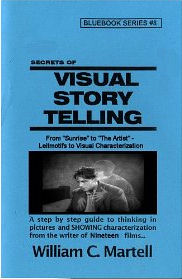
I WRITE PICTURES!
*** VISUAL STORYTELLING *** - For Kindle! (exclusive)
Show Don't Tell - but *how* do you do that? Here are techniques to tell stories visually! Using Oscar Winning Films and Oscar Nominated Films as our primary examples: from the first Best Picture Winner "Sunrise" (1927) to the Oscar Nominated "The Artist" (which takes place in 1927) with stops along the way Pixar's "Up" and Best Original Screenplay Winner "Breaking Away" (a small indie style drama - told visually) as well as "Witness" and other Oscar Winners as examples... plus RISE OF THE PLANET OF THE APES. Print version is 48 pages, Kindle version is over 200 pages!
ONLY $4.99 - and no postage!
DESCRIPTION & VOICE Blue Book!
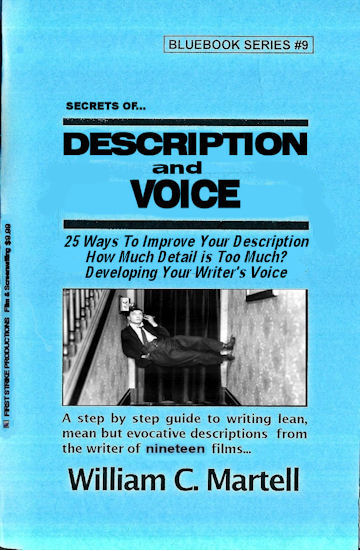
DESCRIPTION & VOICE Blue Book.
IS HALF OF YOUR STORY IN TROUBLE?
Most screenplays are about a 50/50 split between dialogue and description - which means your description is just as important as your dialogue. It just gets less press because the audience never sees it, the same reason why screenwriters get less press than movie stars. But your story will never get to the audience until readers and development executives read your script... so it is a very important factor. Until the movie is made the screenplay is the movie and must be just as exciting as the movie. So how do you make your screenplay exciting to read? Description is important in a novel as well, and the “audience” does read it... how do we write riveting description?
Only $4.99 and no postage!

PRO DIALOGUE TECHNIQUES!
*** DIALOGUE SECRETS *** - For Kindle!
***
Expanded version with more ways to create interesting dialogue! How to remove bad dialogue (and what *is* bad dialogue), First Hand Dialogue, Awful Exposition, Realism, 50 Professional Dialogue Techniques you can use *today*, Subtext, Subtitles, Humor, Sizzling Banter, *Anti-Dialogue*, Speeches, and more. Tools you can use to make your dialogue sizzle! Special sections that use dialogue examples from movies as diverse as "Bringing Up Baby", "Psycho", "Double Indemnity", "Notorious", the Oscar nominated "You Can Count On Me", "His Girl Friday", and many more! Print version is 48 pages, Kindle version is over 175 pages!
Only $4.99 - and no postage!

WHAT IS A SCENE?
*** SCENE SECRETS *** - For Kindle!
***
What is a scene and how many you will need? The difference between scenes and sluglines. Put your scenes on trial for their lives! Using "Jaws" we'll look at beats within a scene. Scene DNA. Creating set pieces and high concept scenes. A famous director talks about creating memorable scenes. 12 ways to create new scenes. Creating unexpected scenes. Use dramatic tension to supercharge your scenes. Plants and payoffs in scenes. Plus transitions and buttons and the all important "flow"... and more! Over 65,000 words! Print version was 48 pages, Kindle version is around 210 pages!
Only $4.99 - and no postage!
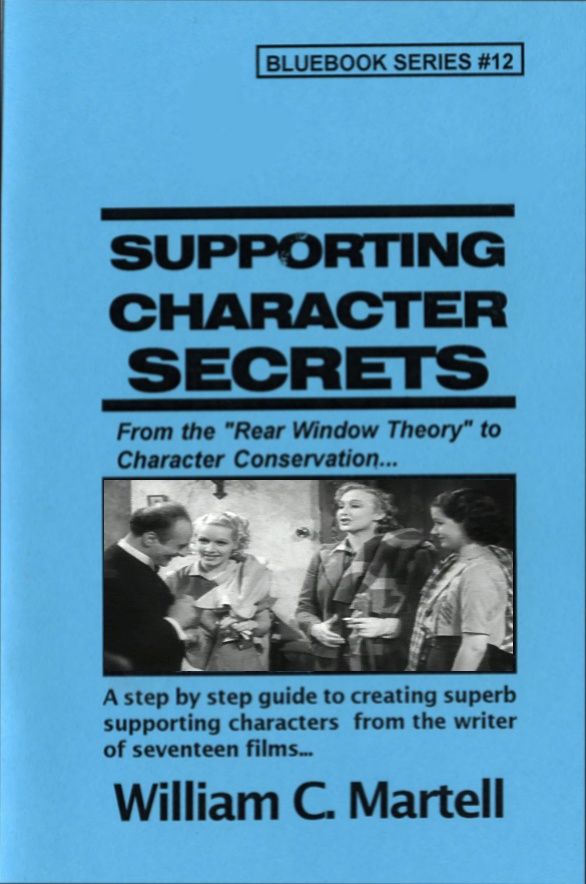
SUBPLOTS?
*** SUPPORTING CHARACTER SECRETS *** - For Kindle! (Exclusive)
Expanded version with more techniques to flesh out your Supporting Characters and make them individuals. Using the hit movie BRIDESMAIDS as well as other comedies like THE HANGOVER and TED and HIGH FIDELITY and
40 YEAR OLD VIRGIN and many other examples we look at ways to make your Supporting Characters come alive on the page.
Print version was 48 pages, Kindle version is around 170 pages!
ONLY $4.99 - and no postage!
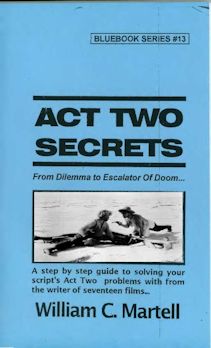
ACT TWO SOLUTIONS!
*** ACT TWO SECRETS *** - For Kindle!
Expanded version with more techniques to help you through the desert of Act Two! Subjects Include: What Is Act Two? Inside Moves, The 2 Ps: Purpose & Pacing, The 4Ds: Dilemma, Denial, Drama and Decision, Momentum, the Two Act Twos, Subplot Prisms, Deadlines, Drive, Levels Of Conflict, Escalation, When Act Two Begins and When Act Two Ends, Scene Order, Bite Sized Pieces, Common Act Two Issues, Plot Devices For Act Two, and dozens of others. Over 67,000 words (that’s well over 200 pages) of tools and techniques to get you through the desert of Act Two alive!
Print version was 48 pages, Kindle version is well over 200 pages!
ONLY $4.99 - and no postage!
BRAND NEW!!
All About Rewrites!
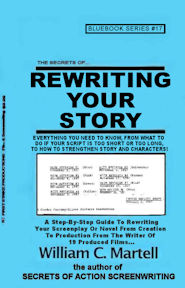
Rewriting In Waves?
*** REWRITES Blue Book! - For Kindle!
The end is just the beginning! You’ve finished your story, but now the rewriting begins! This 405 page book shows you how to rewrite your screenplay or novel to perfection. Everything from Character Consistency to Shoeboxing to How To Give And Receive Notes to 15 Solutions If Your Script’s Too Long! and 15 Solutions If Your Script’s Too Short! to Finding The Cause Of A Story Problem to Good Notes Vs. Bad Notes to Finding Beta Readers to Avoiding Predictability to Learning To Be Objective About Your Work to Script Killer Notes and Notes From Idiots to Production Rewrites and What The Page Colors Mean? and a Complete Rewrite Checklist! The complete book on Rewriting Your Story!
ONLY $4.99 - and no postage!
All About Endings!
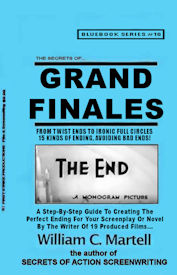
GRAND FINALES Blue Book!
The Perfect Ending For Your Story!
The First Ten Pages Of Your Screenplay Are Critical,
But What About The Last 10 Pages?
Creating the perfect ending to your story! This 100,000 word book shows you how to end your story with a bang, rather than a whimper. Everything from Resolution Order to Act Three Tools to Happy or Sad Endings? to How The Beginning Of Your Story Has Clues To The Ending (in case you were having trouble figuring out how the story should end) to Falling Action to How To Avoid Bad Endings to Writing The Perfect Twist Ending to Setting Up Sequels & Series to Emotional Resolutions to How To Write Post Credit Sequences to Avoiding Deus Ex Machinas, to 20 Different Types Of Ends (and how to write them) and much more! Everything about endings for your screenplay or novel!
Only: $4.99
NO KINDLE REQUIRED! Get the *free* app (any device, except your Mr. Coffee) on the order page on Amazon!
All About LOGLINES, TREATMENTS, and PITCHING!
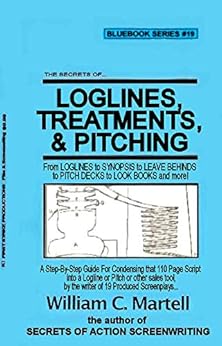
LOGLINES, TREATMENTS, and PITCHING! Blue Book!
Distilling Your Screenplay!
Loglines, Treatments, Pitching, Look Books, Pitch Decks, One Pagers, Rip-O-Matics?
You have written a brilliant 110 page screenplay, but how do you get anyone to read it? You need to distill it down into some form of verbal moonshine or story rocket fuel that will ignite that bored development executive or manager or agent and get them to request your screenplay. But how do you shrink those 110 pages into a 25 word logline or a 2 minute elevator pitch or a one page synopsis or a short paragraph? This 100,000 word book shows you how! Everything you need to know! From common logline mistakes (and how to solve them) to how your pitch can reveal story problems to the 4 types of pitches!
272 Pages - ONLY $4.99!
READY TO BREAK IN?
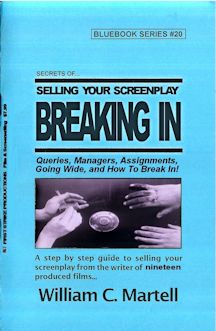
THE BUISINESS SIDE
*** BREAKING IN BLUE BOOK *** - For Kindle!
Should really be called the BUSINESS BLUE BOOK because it covers almost everything you will need to
know for your screenwriting career: from thinking like a producer and learning to speak their language,
to query letters and finding a manager or agent, to making connections (at home and in Hollywood) and
networking, to the different kinds of meetings you are will have at Studios, to the difference between
a producer and a studio, to landing an assignment at that meeting and what is required of you when you
are working under contract, to contracts and options and lawyers and... when to run from a deal!
Information you can use *now* to move your career forward! It's all here in the Biggest Blue Book yet!
Print version was 48 pages, Kindle version is over 400 pages!
$4.99 - and no postage!

Movie Magic Screenwriter is the best selling screenplay formatting software and the choice of Hollywood professionals. Screenwriter automatically formats while you write so you can focus on what you're writing, not where it goes on the page. It also formats for television, stage, novels and comic book scripts so you've got an all in one package for any story you want to write. Academy Award Tech Winner!
* * * Buy It!

|
|
|
|
|
E BOOKS PAGE
|
|
 E BOOKS: New Blue Books and Novelettes!
E BOOKS: New Blue Books and Novelettes!
I am expanding all of the Blue Books from around 44 pages of
text to around 200 pages! Some are over 250 pages! See what is availabale and what is coming soon!Also, I've been writing Novelletes and there
will soon be novels.
E BOOKS: BLUE BOOKS & NOVELLETES
|
|
ONLINE CLASSES
|
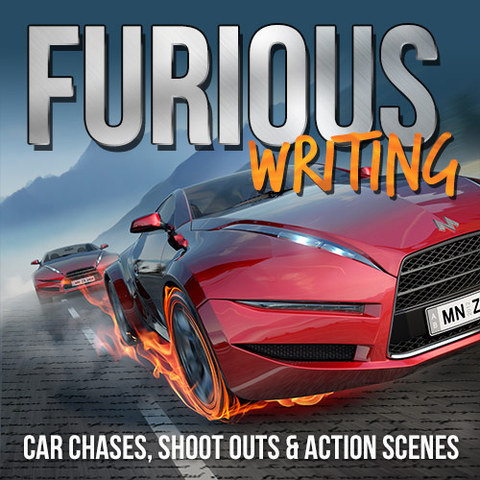
|
|
MY OTHER SITES
|
|
B MOVIE WORLD
Cult Films, Exploitation, Bikers & Women In Prison, Monster Movies.
FIRST STRIKE PRODUCTIONS
Producing my own scripts, investment possibilities, pipe dreams.
|
|
NAKED SCREENWRITING CDs
|
|
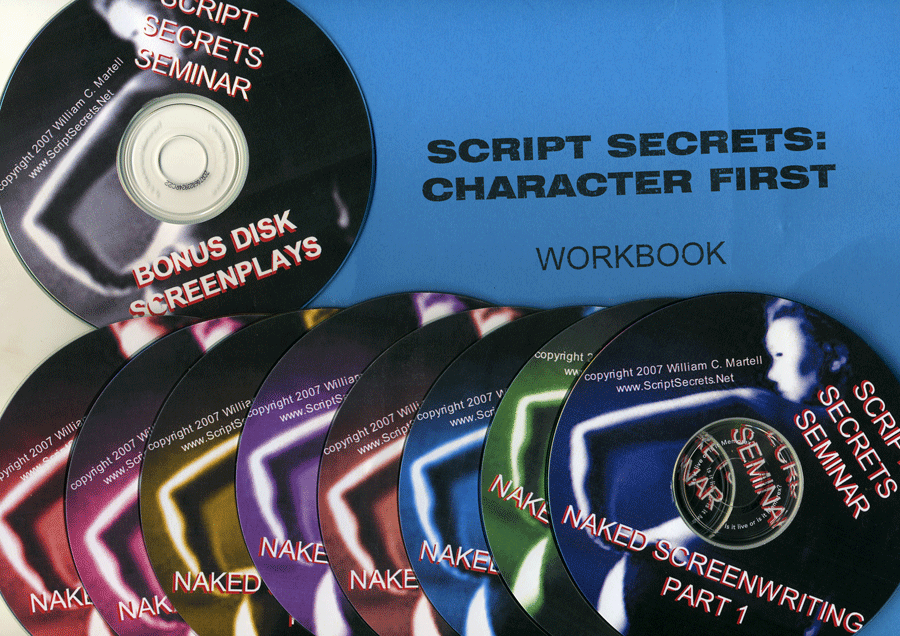 The NAKED SCREENWRITING CLASS ON CD!
The 2001 London Class on 8 CDs! Recorded *live* the morning after the Raindance Film Festival
wrapped. The two day class on 8CDs, plus a workbook, plus a bonus CD with PDFs.
The NAKED SCREENWRITING CLASS ON CD!
The 2001 London Class on 8 CDs! Recorded *live* the morning after the Raindance Film Festival
wrapped. The two day class on 8CDs, plus a workbook, plus a bonus CD with PDFs.
The 2 Day Class on CD!
|
|
BOOKSTORE
|
|
Every screenwriting book in the world!
SCREENWRITER'S BOOKSTORE
In Association With Amazon.com
From the latest screenwriting book to
guides for finding agents and producers... all with at the
Amazon.com discount!
|
|
BOOKLETS & PRODUCTS
|
|
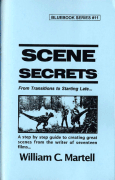 FIRST STRIKE BLUE BOOKS
FIRST STRIKE BLUE BOOKS
Each Blue Book is 48
pages and focuses on a different aspect of screenwriting. Dialogue. Visual Storytelling. Your First Ten Pages. Act 2 Booster. Protagonists. Great Endings.
Seventeen Blue Books now available!
THE SECRETS OF ACTION SCREENWRITING The Best Nuts & Bolts Screenwriting Book On The
Market!
|
|
BILL'S CORNER
|
|
My
nineteen produced films, interviews with me in magazines,
several sample scripts, my available scripts list... And MORE!
...............................BILL'S CORNER
Available Scripts
|
|
CLASSES ON CD
|
|
 CLASSES ON CD! Take a class on CD! GUERRILLA MARKETING - NO AGENT? NO PROBLEM! and WRITING THRILLERS (2 CDs). Full length classes on CD. Now Available: IDEAS & CREATIVITY, WRITING HORROR, WRITING INDIE FILMS, more!
CLASSES ON CD! Take a class on CD! GUERRILLA MARKETING - NO AGENT? NO PROBLEM! and WRITING THRILLERS (2 CDs). Full length classes on CD. Now Available: IDEAS & CREATIVITY, WRITING HORROR, WRITING INDIE FILMS, more!
Take classes on CD!
|
|
|
|
|

